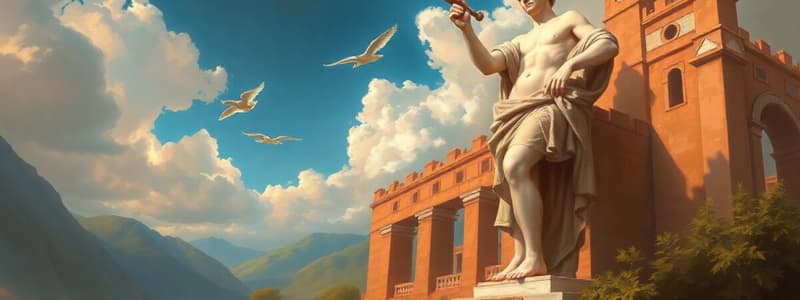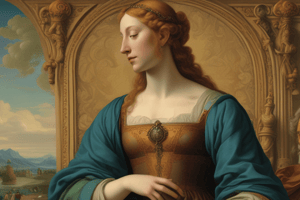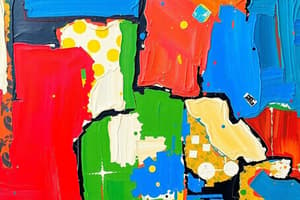Podcast
Questions and Answers
What does Michelangelo's Dying Slave symbolize?
What does Michelangelo's Dying Slave symbolize?
- The soul’s struggle against temptation and sin (correct)
- The power of creativity in sculpture
- The celebration of life and joy
- The inevitability of death and decay
Which unique characteristic defines Michelangelo's Dawn sculpture?
Which unique characteristic defines Michelangelo's Dawn sculpture?
- It features a serene expression
- It has a detailed background landscape
- It is the only female nude he ever sculpted (correct)
- It depicts a figure in battle
What is Leonardo da Vinci often referred to as due to his diverse talents?
What is Leonardo da Vinci often referred to as due to his diverse talents?
- The master of chiaroscuro
- The artist of the century
- The Renaissance man (correct)
- The father of Modern Science
Where is Leonardo da Vinci's mural painting The Last Supper located?
Where is Leonardo da Vinci's mural painting The Last Supper located?
Which aspect of Dusk and Dawn reflects their allegorical representation?
Which aspect of Dusk and Dawn reflects their allegorical representation?
What characterizes Renaissance art?
What characterizes Renaissance art?
Which work of Michelangelo represents a portrayal of pain and redemption?
Which work of Michelangelo represents a portrayal of pain and redemption?
What was the original purpose for which Michelangelo's statue of David was commissioned?
What was the original purpose for which Michelangelo's statue of David was commissioned?
How is Bacchus depicted in Michelangelo's sculpture?
How is Bacchus depicted in Michelangelo's sculpture?
What does the statue of David symbolize in the context of Renaissance Florence?
What does the statue of David symbolize in the context of Renaissance Florence?
What artistic method is reflected in the accurate representation of the human body during the Renaissance?
What artistic method is reflected in the accurate representation of the human body during the Renaissance?
In what year was the statue of David unveiled at Piazza della Signoria?
In what year was the statue of David unveiled at Piazza della Signoria?
What dual qualities are portrayed in the statue of Bacchus?
What dual qualities are portrayed in the statue of Bacchus?
What effect is primarily demonstrated in Raphael's The School of Athens?
What effect is primarily demonstrated in Raphael's The School of Athens?
What is a well-known characteristic of the Sistine Madonna?
What is a well-known characteristic of the Sistine Madonna?
Which statement is true about the Transfiguration of Jesus?
Which statement is true about the Transfiguration of Jesus?
What new type of bas-relief did Donatello develop for smaller works?
What new type of bas-relief did Donatello develop for smaller works?
In what capacity did Donatello commonly employ assistants?
In what capacity did Donatello commonly employ assistants?
Which art style is considered to be exemplified by the frescoes in the Stanze di Raffaello?
Which art style is considered to be exemplified by the frescoes in the Stanze di Raffaello?
What significant achievement is associated with Donatello?
What significant achievement is associated with Donatello?
Which of the following best describes the emotional portrayal of the Virgin and Jesus in the Sistine Madonna?
Which of the following best describes the emotional portrayal of the Virgin and Jesus in the Sistine Madonna?
What is distinctive about the Vitruvian Man drawing?
What is distinctive about the Vitruvian Man drawing?
Which of the following paintings is associated with the Nativity of Jesus?
Which of the following paintings is associated with the Nativity of Jesus?
Which statement is true regarding the Virgin of the Rocks?
Which statement is true regarding the Virgin of the Rocks?
What is notable about the Mona Lisa?
What is notable about the Mona Lisa?
In what medium was the Vitruvian Man created?
In what medium was the Vitruvian Man created?
Which artist is credited with the creation of the Mona Lisa?
Which artist is credited with the creation of the Mona Lisa?
What theme is prevalent in The Adoration of the Magi?
What theme is prevalent in The Adoration of the Magi?
What is a common characteristic of the two versions of Virgin of the Rocks?
What is a common characteristic of the two versions of Virgin of the Rocks?
What material was used for the statue of St. George carved by Donatello?
What material was used for the statue of St. George carved by Donatello?
What is the significance of St. George for the guild of armorers and sword makers?
What is the significance of St. George for the guild of armorers and sword makers?
What event does 'The Feast of Herod' sculpture depict?
What event does 'The Feast of Herod' sculpture depict?
Who was the sculpture 'Gattamelata' created to commemorate?
Who was the sculpture 'Gattamelata' created to commemorate?
What does the name 'Zuccone' refer to in relation to Donatello's statue of the prophet Habakkuk?
What does the name 'Zuccone' refer to in relation to Donatello's statue of the prophet Habakkuk?
During which years was the statue of Habakkuk, known as Zuccone, completed?
During which years was the statue of Habakkuk, known as Zuccone, completed?
Where is the Equestrian Monument of Gattamelata located?
Where is the Equestrian Monument of Gattamelata located?
What was notable about 'The Feast of Herod' sculpture in terms of Donatello's work?
What was notable about 'The Feast of Herod' sculpture in terms of Donatello's work?
Flashcards
Renaissance Period
Renaissance Period
A period of significant artistic and intellectual development (1400-1600), marked by a renewed interest in classical learning and values, economic progress, and secular art.
Michelangelo
Michelangelo
A highly celebrated Italian Renaissance artist (sculptor, painter, architect, poet) considered one of history's greatest.
David (sculpture)
David (sculpture)
Michelangelo's marble statue of the biblical hero David, located in Florence.
Pieta
Pieta
Signup and view all the flashcards
Bacchus (sculpture)
Bacchus (sculpture)
Signup and view all the flashcards
Renaissance art characteristics
Renaissance art characteristics
Signup and view all the flashcards
Secular art
Secular art
Signup and view all the flashcards
Renaissance
Renaissance
Signup and view all the flashcards
Michelangelo's 'Dying Slave'
Michelangelo's 'Dying Slave'
Signup and view all the flashcards
'Dawn' sculpture
'Dawn' sculpture
Signup and view all the flashcards
Dusk and Dawn Sculptures
Dusk and Dawn Sculptures
Signup and view all the flashcards
Leonardo da Vinci's 'The Last Supper'
Leonardo da Vinci's 'The Last Supper'
Signup and view all the flashcards
Leonardo da Vinci
Leonardo da Vinci
Signup and view all the flashcards
Mona Lisa
Mona Lisa
Signup and view all the flashcards
Vitruvian Man
Vitruvian Man
Signup and view all the flashcards
Adoration of the Magi
Adoration of the Magi
Signup and view all the flashcards
Virgin of the Rocks
Virgin of the Rocks
Signup and view all the flashcards
Raphael (Raffaello Sanzio da Urbino)
Raphael (Raffaello Sanzio da Urbino)
Signup and view all the flashcards
High Renaissance
High Renaissance
Signup and view all the flashcards
What are the gifts that the Magi bring to Jesus?
What are the gifts that the Magi bring to Jesus?
Signup and view all the flashcards
The Sistine Madonna
The Sistine Madonna
Signup and view all the flashcards
School of Athens
School of Athens
Signup and view all the flashcards
Transfiguration of Jesus
Transfiguration of Jesus
Signup and view all the flashcards
Donatello
Donatello
Signup and view all the flashcards
Bas-relief
Bas-relief
Signup and view all the flashcards
David (Donatello)
David (Donatello)
Signup and view all the flashcards
What is a key feature of Donatello's work?
What is a key feature of Donatello's work?
Signup and view all the flashcards
What materials did Donatello use?
What materials did Donatello use?
Signup and view all the flashcards
Donatello's St. George Statue
Donatello's St. George Statue
Signup and view all the flashcards
Equestrian Monument of Gattamelata
Equestrian Monument of Gattamelata
Signup and view all the flashcards
Donatello's 'Zuccone'
Donatello's 'Zuccone'
Signup and view all the flashcards
What is 'The Feast of Herod'?
What is 'The Feast of Herod'?
Signup and view all the flashcards
Where is 'The Feast of Herod' located?
Where is 'The Feast of Herod' located?
Signup and view all the flashcards
What medium did Donatello use for 'The Feast of Herod'?
What medium did Donatello use for 'The Feast of Herod'?
Signup and view all the flashcards
Which of Donatello's sculptures is NOT in Florence?
Which of Donatello's sculptures is NOT in Florence?
Signup and view all the flashcards
Which of Donatello's sculptures depicts a biblical figure?
Which of Donatello's sculptures depicts a biblical figure?
Signup and view all the flashcards
Study Notes
Renaissance Period (1400-1600)
- Renaissance was a period of economic growth and enthusiasm for ancient philosophy and artistic values.
- The Italian Renaissance started in the late 14th century and was a time of significant artistic and intellectual advancements, marking the birth of secular art.
- Renaissance art featured accurate anatomy, scientific perspective, and detailed landscapes.
- Artists depicted realistic figures and balanced compositions.
Michelangelo (1475-1564)
- Michelangelo was a renowned Italian sculptor, painter, architect, and poet.
- He was considered the greatest living artist of his time and remains one of history's greatest artists.
- He produced impressive works in painting, sculpture, and architecture.
Pieta
- The Pieta portrays the pain associated with redemption, shown through the Madonna holding Christ's body.
- Michelangelo skillfully depicts the divine qualities of the figures using realistic human beauty standards.
David (1501-1504)
- The David statue is a 5.17-meter marble statue of the biblical hero, created by Michelangelo.
- The statue was originally intended for the Florence Cathedral but eventually placed in the Piazza della Signoria.
Bacchus (1496-1497)
- A marble statue of the Roman god of wine, Bacchus, in a drunken pose.
- The sculpture features exaggerated features like rolling eyes and is somewhat large in scale.
- The figure of a satyr eating grapes is depicted seated behind Bacchus.
Dying Slave
- Depicts a slave figure sinking into a state of profound despair, almost surrendering to death.
- Michelangelo crafted the figure's intense emotional state in its flowing contours of the arched back, extended arms, and relaxed abdomen.
- These figures were considered to be struggles against temptation and sin.
Dawn
- A female nude sculpture highlighting artistic prowess by Michelangelo.
- The figure is portrayed in a calm but dynamic pose, facing the viewer.
- Her features, such as her dark and deep-set eyes, create an impression of intense contemplation and thoughtful emotions. A head covering and a band on her chest are in the style of slaves garments.
Dusk
- The sculpture, representing Dusk in an allegorical sculpture of time, is a part of a larger work that includes The Dawn statue.
- It is graceful and expressive and depicts a male figure.
- The figures are detailed with soft outlines.
Leonardo da Vinci (1452-1519)
- Leonardo da Vinci was a highly talented painter, architect, scientist and mathematician.
- He was influential in the Renaissance period making contributions to art, science which were displayed in his most famous works.
- He gained a globally recognized reputation through his novel and movie "Da Vinci Code".
- He was seen as an ultimate Renaissance man because of his intellect, interests, talent and expression of humanist and classical values.
The Last Supper (late 15th Century)
- A mural painting made by Leonardo da Vinci in the Convent of Santa Maria delle Grazie, Milan.
- A renowned and iconic work of art.
Mona Lisa (16th Century)
- A half-length portrait of a woman, by the artist Leonardo da Vinci.
- This portrayal is widely regarded as one of the most famous and recognizable paintings of all time.
- It's known as the most sung, visited written about, and parodied artwork in the world.
The Vitruvian Man (1490)
- A pen-and-ink drawing by Leonardo da Vinci.
- It depicts a male figure in two overlapping positions, showing the relationship between human proportions and geometric shapes. The drawing also includes handwritten notes.
The Adoration of the Magi (15th Century)
- A religious art characterized by the portrayal of the biblical Magi presenting gifts to the infant Jesus, by artists during the Renaissance.
Virgin of the Rocks (15th Century)
- A painting done by Leonardo da Vinci. The artwork depicts the Virgin, Child Jesus, and other figures in a rocky landscape.
- There are multiple versions/paintings of the same subject
Raphael Sanzio da Urbino (1483-1520)
- A famous Italian painter and architect, contributing significantly during the High Renaissance.
- His artwork was known for its clear forms, easy compositions, and the successful interpretation of Christian values and beliefs.
The Sistine Madonna (1500-1501)
- A painting which features the Virgin Mary and baby Jesus amidst other figures.
- It showcases a sense of wonder, tranquility and gentle devotion and expresses Mary's gentle nature.
The School of Athens (1509-1511)
- Raphael's fresco in the walls of the Vatican palaces. A famous depiction of ancient Greek philosophers engaging in intellectual activities.
The Transfiguration (1517-1520)
- Raphael's last painting; a depiction of a significant event from the New Testament.
- Jesus is transfigured on a mountain and becomes radiant in glory.
Donatello (c. 1386-1466)
- An early Renaissance sculptor from Florence.
- Known for his shallow relief sculptures and mastery of the classical techniques.
- He developed a fully Renaissance style by studying classical sculpture and utilizing materials like stone, bronze, wood, clay, stucco, and wax.
- He worked using assistants with four being a typical number of assistants.
David (1408-09, 1430's or later)
- Two sculptures of the biblical hero David by Donatello.
- One a clothed figure, while the other is a renowned nude bronze figure. Dates are estimates.
Statue of St. George (15th Century)
- A bronze statue of St. George - the patron saint of the armorers' guild in Florence.
- It was placed in the guild's quarters, at the building known as Orsanmichele.
- It represents the patron saint who was associated with military prowess in the Byzantine era and Crusaders.
Equestrian Monument of Gattamelata (1447-1453)
- Donatello created a bronze equestrian statue of Erasmo da Narni (Gattamelata), a celebrated condottiero (military leader).
- It's located in Padua, Italy, and stands as a significant depiction of a Renaissance figure
Prophet Habakkuk (1423-1425)
- A marble statue of the prophet, commissioned for the Florence Duomo.
- The name "Zuccone" refers to the sculpture's distinguishing, long, angular head shape.
The Feast of Herod (c.1427)
- Donatello's bronze relief panel shows the biblical story of John the Baptist's execution.
- It is located in the Siena Cathedral's baptistry.
Studying That Suits You
Use AI to generate personalized quizzes and flashcards to suit your learning preferences.




